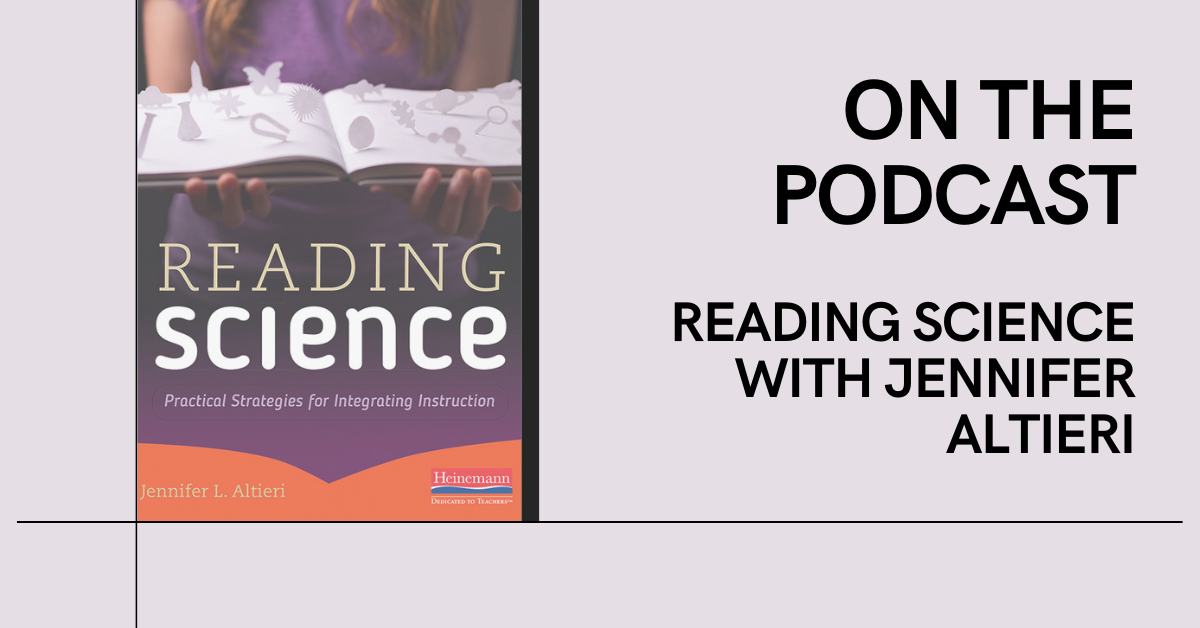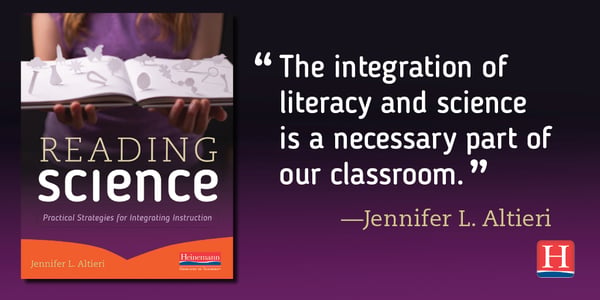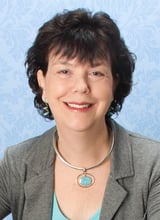 In her newest book, Reading Science, author Jennifer Altieri reminds us that literacy skills aren’t add-ons to the science class—they are critical parts of instruction.
In her newest book, Reading Science, author Jennifer Altieri reminds us that literacy skills aren’t add-ons to the science class—they are critical parts of instruction.
Since science requires specialized literacy demands, students should be prepared for, not only today’s science class, but for future science classes and the world beyond the classroom. Jennifer writes that a love of reading is just a start and that literacy in all areas keeps doors open.
Below is a transcript of this episode.
Jennifer: Content literacy is a term that we've used for a long time. It often referred to anything that you were teaching, such as science, or social studies, or math, beyond ELA. The newer term, and they're really not supposed to be used interchangeably is disciplinary literacy. It's because it acknowledges ... Shanahan uses the term and does a lot of research with that. It acknowledges that there are differences. It's not one big group of topics or subjects outside of writing and reading. It's they each have their own little idiosyncrasies. At the same time, we often say, "Well, what content areas do you teach?" We still aren't really saying, "What disciplines do you teach?" in third grade, fourth grade, fifth grade.
I use the terms also at times when I mean ... If I think that, depending on who I'm talking to, because in the educational community, I think content literacy is still a term. We're still teaching a course called content literacy for teachers, but I focus more on disciplinary, that each area is unique. I think we're moving and gravitating in that direction.
Brett: Content areas like science require a lot of hands-on learning. How and where do literacy skills support this?
Jennifer: We have to have the hands-on. If we don't have the hands-on, kids are not going to develop the deep knowledge of science that they need in the world today by reading about it. We have to have the hands-on, but literacy skills and hands-on have to work together. We're not going to strengthen their knowledge without literacy skills. If kids cannot read the directions, which is a very unique type of writing, to do an experiment, conduct an experiment, or they can't communicate in writing what they observe, it's not going to be ... They're not going to have that science knowledge, so you've got to have both. You have to also build prior knowledge. You can't always do experiments for everything. We're not going to take our class to Mars, so there's going to be some use of digital text, or some reading of traditional text, and students have to be able to understand and comprehend that information.
Brett: Science texts often require students to look at a lot of images, graphs, charts. How can we help students approach these types of texts?
Jennifer: Science has a lot of images, and they're showing that science textbooks have more and more images, and more complex images. The good thing is I feel like kids nowadays are encountering a lot of images just in the world around them, so they're seeing images. What they have to realize is they're also valuable when they see them in the text.
You can't just skip it. You can't just glance at an image, because they're in there for a reason. There's a reason the person put them in, the author, the publisher, not just to use up page. They have to figure out how does the information in that image tie into what they're reading. They have to think about it. They have to look at what they know, and how does that fit, and does it make sense, and that? Images are very powerful, and we have to help students to be able to use those images, and to get the information from them.
Brett: What are other complexities that teachers should consider when working with science texts?
Jennifer: One of the things is I think again, we're looking at our goal. Our goal is, and I keep telling myself this, we're not around forever. When they encounter text, they have to be able to be independent readers, and understand the text. I think some of the best things we can do with kids is the complexities. Make sure that there are diverse texts, that kids understand how to use text features such as headings, and glossary, and things like that. We have to help kids realize just like you don't ever believe something you hear from one source, we have to get kids using multiple sources on the same topic, so that they can synthesize and analyze what they're reading.
Another thing I think with the complexities is we do local text, which is text created by students in the classroom. We have to use that text to the best of our ability. I know we use it a lot with creating maybe a mural, creating a diagram, but anytime we can tie that back into what we're teaching, we can get a lot of learning out of that local, student-created text that can help us with the more standard, printed texts.
Brett: How do we pick good trade texts, good trade science texts?
Jennifer: There's so much you have to look at. You have to look at the quality of the writing. You have to look at the ... I think the most important thing is the author's background, and whether it's given to you, or perhaps you can check it out and find the information on the author, and whether he has the background knowledge, or she has the background knowledge.
I think you also have to consider if it's a digital text, then it doesn't go through quite the same review process. Kids, you talk about, you can put things on the internet quite easily, and therefore you really have to look at information on the background, where the pictures are coming from, where the images are coming from, and things like that.
Brett: Are there any good trade books out there for science you would recommend?
Jennifer: Oh my gosh. I don't think I can recommend just one. I know there are just so many authors out there. The good thing about trade books ... I'm going to say ... I'm not going to pick any one author, but one of the good things about the trade books is unlike textbooks, they're published constantly. They're updated. You're not reading that man is going to land on the moon. He's already got there. If he hasn't, then you get rid of the book.
Brett: Yeah.
Jennifer: That's the great thing about trade books. The quality of images and everything has just improved so much over time.
Brett: What are one or two things I can do tomorrow to incorporate more literacy skills into a content area like science, and what kinds of supports are available in Reading Science to help with this?
Jennifer: I think the one thing that can be done tomorrow is to look, take second look at the texts that are being used. If you are teaching about space, or you are teaching about whatever topic, look at the different texts that you are incorporating into your lessons. Make sure like we've talked about that they're diverse, that you're using informational texts, that they're currently written. In Reading Science, there are different evaluation instruments that will help you to look at trade books versus digital texts.
The other thing I would say is look at the vocabulary your students, the terms that they are encountering, because some words students will encounter in other areas. Some words they know, they don't have to be taught. Then with other words, perhaps it's better to teach small chunks of the words, especially in science, such as hydro is used in a lot of words, osis, ology. If they know those little morphemes, or units of meaning, then it can help them to know future words they encounter. With the vocabulary also, you've got to look at the ... Okay. With the vocabulary, you also have to focus on the relationship of the words they encounter. Within Reading Science, there are a lot of hands-on activities that you can use in the classroom to develop vocabulary knowledge. There are lots of student samples also, to give you an idea of what to expect.

 Jennifer Altieri has been a teacher, reading consultant, and is currently associate professor of literacy at Coastal Carolina University. The author of multiple books and a frequent presenter at conferences, Jennifer is passionate about developing readers, writers, and thinkers through content literacy.
Jennifer Altieri has been a teacher, reading consultant, and is currently associate professor of literacy at Coastal Carolina University. The author of multiple books and a frequent presenter at conferences, Jennifer is passionate about developing readers, writers, and thinkers through content literacy.
Follow her on Twitter: @JenniferAltier1



